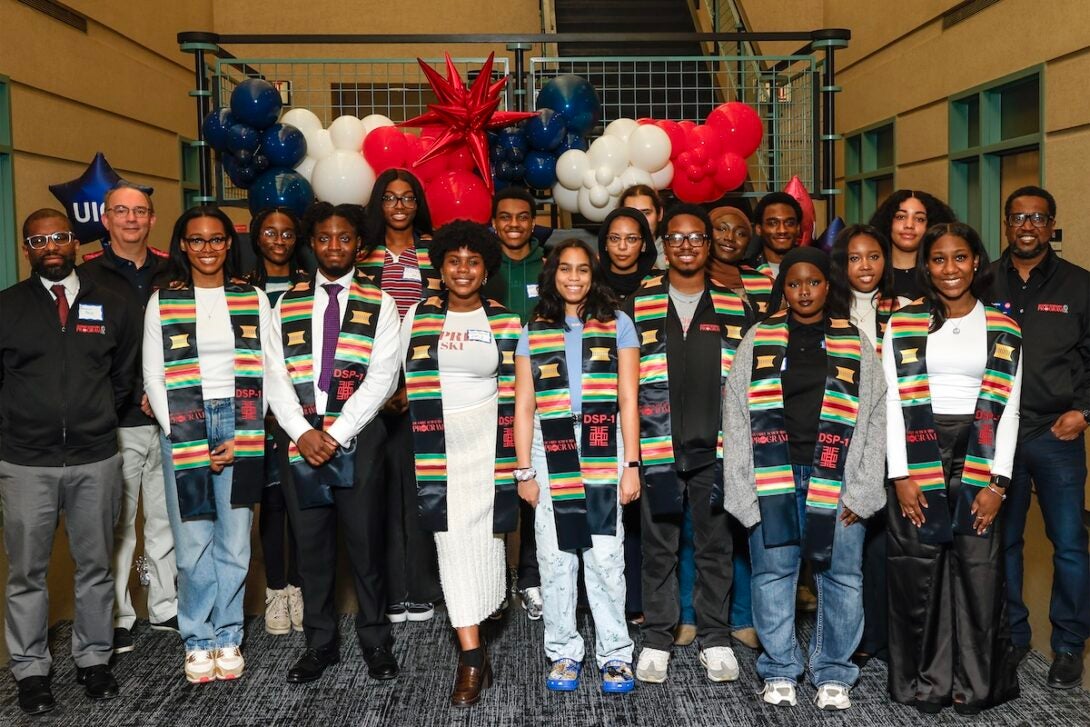DuSable Scholars program celebrates first graduating cohort at UIC
DuSable Scholars program celebrates first graduating cohort at UIC

As Tia Stewart prepares to graduate from UIC in May, she is grateful for the networking and camaraderie she found at UIC.
Stewart, a biological science major, will continue her studies as a graduate student in the fall and will work in the lab of Jarrad Hampton-Marcell, an assistant professor of biological sciences.
“I’ve been networking since my first year, and many people can’t say that,” Stewart said. “I am moving on to grad school because of this program.”
Stewart is one of 15 DuSable Scholars to graduate this academic year, contributing to a 78% graduation rate for the program. Stewart and her peers make up the program’s first cohort of graduates.
One student, Samantha Applewhite, graduated in December with a bachelor’s degree in integrated health studies and will be studying to be a dentist in the UIC College of Dentistry.
UIC senior Larry Bryant, who is graduating with a computer science degree, said the program’s focus on building a community was a significant reason for his success. The program requires students to live together on campus for the first two years, but he chose to live on campus all four years because of the support it offered him.
As the first person in his family to pursue a STEM degree, he valued living close to others in similar classes, he said. That made it easy to connect with homework help or study sessions.
“The community aspect was very big for me, especially with taking classes and having people who I could easily get in contact with,” said Bryant, who is interviewing for positions in data analytics.
DuSable’s mission
The DuSable Scholars Program launched in 2021 to support students who, according to National Science Foundation figures, are often underrepresented in STEM fields. There are currently 64 students in the program, according to Roddric Sims, the program’s director.
DuSable Scholars founder and faculty director Jeremiah Abiade said DuSable Scholars account for nearly 45% of the overall increase in Black undergraduate student enrollment at UIC. And these students do well, he said: DuSable Scholars, on average, have a cumulative 3.37 GPA, Abiade said.
Osayenmwen Omozusi, graduating with a biomedical engineering degree, said that in addition to the family-like atmosphere she found by living on campus for four years, the DuSable Scholars program gave her the tools to focus on her future.
Networking, as part of the program, opened doors for her to work in a bioinformatics lab since her first year, she said. Her long-term goal is to become a physician specializing in infectious diseases. In the short term, she will attend graduate school at UIC and work on her master’s degree in biomedical engineering.
“Not only was I able to get into research, but I want to become a doctor after this,” Omozusi said. “So, it aligned with my career path.”
Biomedical engineering student Michael Bello found connections, mentorship and resources through the program that allowed him to engage in research since his sophomore year. His goal is to attend medical school and go into internal medicine.
Bello conducts gastrointestinal research, focusing on pancreatic and colon cancer and fatty liver disease. He is the lead author on a project about glucose metabolism. The program gave him direction during the uncertain times of the COVID-19 pandemic, helping him visualize his future in STEM.
“There was a time during COVID when I didn’t know what I wanted to do in college,” Bello said. “It’s crucial to have a network of people who want you to succeed and learn.”
Building community
In addition to a community made up by living near each other on campus, the program requires first- and second-year DuSable Scholars to attend the same class every Tuesday, allowing them to build stronger connections.
There are also group activities organized by the older students. The activities range from hot cocoa gatherings to ease pre-exam anxiety to stress-relief sessions where students write their worries on ceramic plates and then shatter them. They also include Black student trivia and game nights.
“It’s things they self-create, and we encourage them to do it and build their community,” said Sims.
Annually, as a cohort, they also attend galas with the DuSable Heritage Association and an overnight research conference sponsored by the Illinois Louis Stakes Alliance for Minority Participation.
Every month during this spring semester, the students gathered for luncheons to hear from Black alums, professors and professionals about their experiences, career paths and other advice. At a recent gathering at the Black Cultural Center, students listened to Karriem Watson, executive director of UI Health Mile Square Health Center, talk about his career path.
One of the scholars listening to Watson was Christian Garcia, a mechanical engineering student. He credits the connections he made through the DuSable program and the mentorship he received with encouraging him to pursue graduate school. Garcia also lived on campus near the other scholars for all four years.
“I’m just happy that there are people who share a similar racial background as I do. It makes me feel a little more at home,” Garcia said.
Connecting with researchers through the program was particularly beneficial, he said. He worked in a research lab for several summers, which led to his current position in a biomedical lab on campus. He is applying to attend UIC graduate school to pursue an engineering degree.
“I wouldn’t have been able to do that without the help of the DuSable program,” Garcia said.
This story first appeared April 29, 2025 on UIC Today.